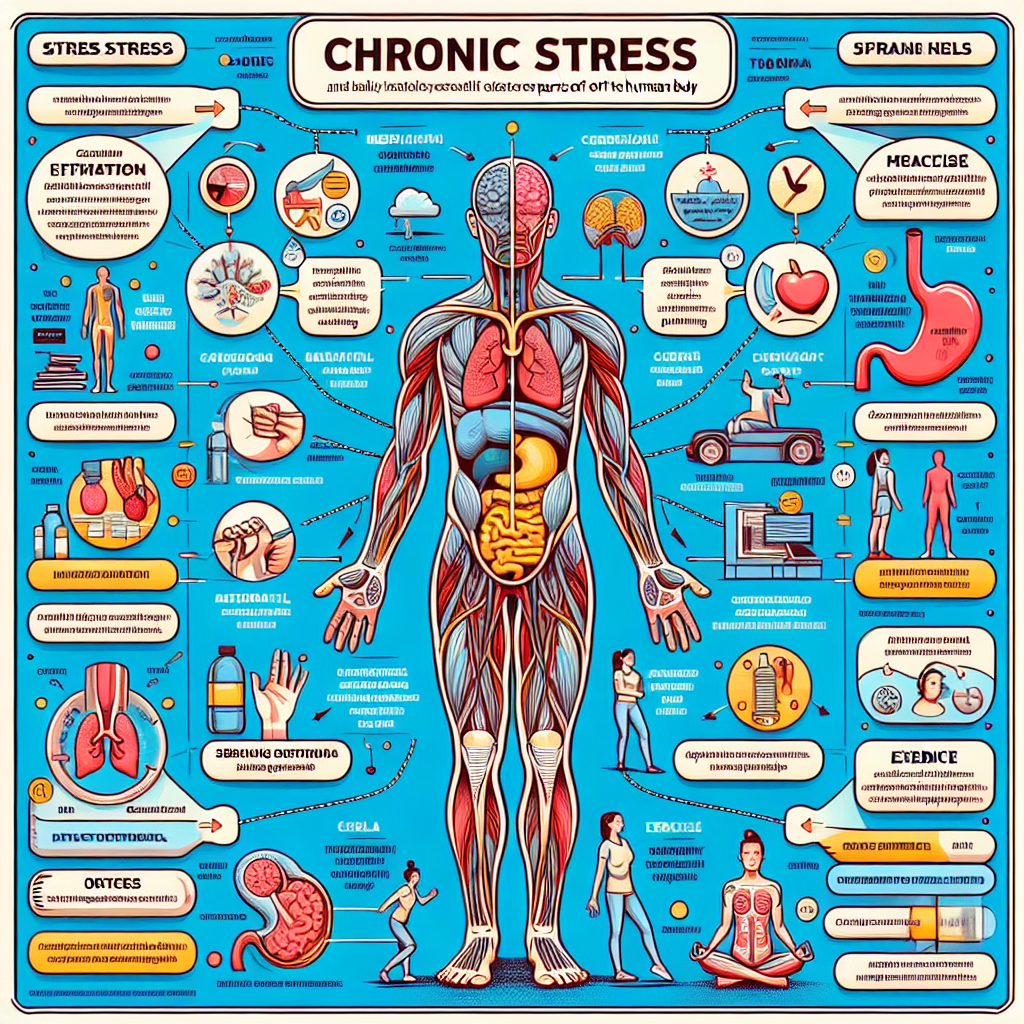How Chronic Stress Affects Your Health and How to Manage It

Discover how chronic stress affects your health and learn effective ways to manage it. Don’t let stress control your life. Take action now and improve your overall well-being. Visit My Vibrant Vitality today.
Understanding the Impact of Chronic Stress on Your Physical Health
Chronic stress, a pervasive issue in today’s fast-paced society, has far-reaching implications for our physical health. It’s not just an emotional or psychological problem; it’s a physiological one that can lead to serious health complications if not properly managed.
The human body is designed to handle stress in small doses. When we encounter a stressful situation, our body responds by releasing stress hormones, such as adrenaline and cortisol, which prepare us for the ‘fight or flight’ response. This is a survival mechanism that allows us to react quickly to dangerous situations. However, when stress becomes chronic, meaning it’s constant and prolonged, it can wreak havoc on our bodies.
Chronic stress can lead to a host of physical health problems. It can disrupt almost all your body’s processes, increasing the risk of numerous health issues, from heart disease and obesity to digestive problems and sleep disorders. One of the most significant impacts of chronic stress is on the cardiovascular system. The constant release of stress hormones raises your heart rate and blood pressure, which over time can lead to hypertension and increase your risk of heart attacks and stroke.
Moreover, chronic stress can also affect your immune system, making you more susceptible to infections and diseases. It can slow wound healing, reduce your body’s response to vaccines, and make you more prone to catch the common cold. It can also exacerbate existing health conditions, such as asthma and other respiratory diseases.
Furthermore, chronic stress can lead to unhealthy lifestyle habits. People under constant stress may turn to alcohol, tobacco, or unhealthy foods as coping mechanisms, which can further deteriorate their physical health. It can also disrupt sleep patterns, leading to insomnia and other sleep disorders, which can have a profound impact on overall health and well-being.
Understanding the impact of chronic stress on your physical health is the first step towards managing it effectively. There are several strategies you can adopt to manage chronic stress and mitigate its effects on your health. Regular physical activity is one of the most effective stress management techniques. Exercise not only improves your physical health but also helps reduce stress hormones and stimulate the production of endorphins, the body’s natural mood elevators.
In addition to regular exercise, maintaining a healthy diet can also help manage stress levels. Consuming a balanced diet rich in fruits, vegetables, lean proteins, and whole grains can provide the necessary nutrients your body needs to cope with stress. Avoiding caffeine, alcohol, and processed foods can also help keep your stress levels in check.
Mindfulness and relaxation techniques, such as meditation, deep breathing, and yoga, can also be beneficial in managing chronic stress. These practices can help you stay calm and focused, reducing the production of stress hormones and promoting a sense of well-being.
Lastly, don’t hesitate to seek professional help if you’re struggling to manage chronic stress on your own. Mental health professionals can provide you with the tools and strategies you need to cope with stress effectively and improve your overall health.
In conclusion, chronic stress can have a profound impact on your physical health, leading to a host of health problems. However, by understanding its effects and adopting effective stress management strategies, you can mitigate its impact and maintain your health and well-being.
Effective Strategies for Managing Chronic Stress and Improving Your Well-being

Chronic stress, a pervasive issue in today’s fast-paced society, can have a profound impact on your health. It’s not just a mental or emotional burden; it can also lead to physical ailments and diseases. Understanding the effects of chronic stress on your health and learning effective strategies to manage it can significantly improve your overall well-being.
Chronic stress can manifest in various ways, from minor irritations like headaches and insomnia to more severe health problems like heart disease and diabetes. When you’re under constant stress, your body is always in a state of high alert, which can lead to an overproduction of stress hormones like cortisol. Over time, this can disrupt almost all your body’s processes, increasing the risk of numerous health problems, including anxiety, depression, digestive problems, headaches, heart disease, sleep problems, weight gain, and memory and concentration impairment.
Moreover, chronic stress can also weaken your immune system, making you more susceptible to infections and diseases. It can also exacerbate existing health conditions. For instance, if you have a heart condition, chronic stress can increase your risk of a heart attack. If you have diabetes, it can make it harder for you to control your blood sugar levels.
Given the significant impact of chronic stress on your health, it’s crucial to learn effective strategies to manage it. One of the most effective ways to combat stress is through regular physical activity. Exercise not only improves your physical health but also helps reduce stress hormones and stimulate the production of endorphins, your body’s natural mood elevators. Even a simple activity like walking for 30 minutes a day can significantly reduce stress levels.
Another effective strategy is to practice mindfulness and relaxation techniques. This could include activities like yoga, meditation, deep breathing exercises, or even just spending time in nature. These activities can help you stay present and focused, reducing your stress levels and promoting a sense of calm and well-being.
Maintaining a healthy diet is also crucial in managing stress. Certain foods can exacerbate stress levels, while others can help to reduce it. For instance, caffeine and sugar can increase stress levels, while foods rich in omega-3 fatty acids, like salmon and walnuts, can help reduce stress hormones.
Getting enough sleep is another essential aspect of stress management. Lack of sleep can exacerbate stress and negatively impact your overall health. Aim for seven to nine hours of sleep per night to ensure your body has enough time to rest and recover.
Lastly, don’t hesitate to seek professional help if you’re struggling to manage your stress levels. Therapists and counselors are trained to help you understand and manage stress, and they can provide you with tools and strategies to cope with it effectively.
In conclusion, chronic stress can have a significant impact on your health, leading to various physical and mental health problems. However, by incorporating regular physical activity, practicing mindfulness and relaxation techniques, maintaining a healthy diet, getting enough sleep, and seeking professional help when needed, you can effectively manage your stress levels and improve your overall well-being. Remember, it’s not just about managing stress, but also about taking care of your overall health.
The Connection Between Chronic Stress and Mental Health: What You Need to Know
Chronic stress, a pervasive issue in today’s fast-paced society, has a profound impact on our mental health. It’s not just an emotional burden; it’s a physical one that can lead to serious health complications if not properly managed. Understanding the connection between chronic stress and mental health is the first step towards effective stress management and overall well-being.
Chronic stress is a prolonged and constant feeling of stress that can negatively affect your health if it goes untreated. It can come from any life situation where you feel frustrated, overworked, or anxious. Unlike acute stress, which is a normal and often healthy response to sudden challenges or threats, chronic stress persists over extended periods, often without any apparent external cause.
The relationship between chronic stress and mental health is complex and multifaceted. Chronic stress triggers a hormonal response, where the body releases cortisol, a stress hormone. While cortisol is beneficial in short-term stressful situations, providing a burst of energy and heightened memory function, its prolonged presence in the body due to chronic stress can lead to numerous health problems. These include anxiety, depression, sleep problems, and memory and concentration impairment.
Anxiety and depression are among the most common mental health issues linked to chronic stress. When you’re constantly in a state of tension and worry, it’s easy for these feelings to escalate into anxiety. Similarly, the constant strain of dealing with chronic stress can lead to feelings of hopelessness and a lack of interest in activities you once enjoyed, hallmarks of depression.
Sleep problems are another common side effect of chronic stress. Stress can cause hyperarousal, a biological state in which people are alert and awake. This state can disrupt the balance between sleep and wakefulness, making it difficult to fall asleep and stay asleep. Lack of sleep can further exacerbate feelings of anxiety and depression, creating a vicious cycle of stress and sleeplessness.
Chronic stress can also impair memory and concentration. The constant release of stress hormones can interfere with the brain’s ability to form new memories and retrieve old ones. This can lead to forgetfulness, difficulty concentrating, and impaired cognitive function.
Understanding the connection between chronic stress and mental health is crucial, but it’s equally important to know how to manage it. Regular physical activity is one of the most effective ways to reduce stress. Exercise not only improves your physical health but also has mood-boosting and anxiety-reducing effects. Mindfulness practices, such as meditation and yoga, can also help reduce stress by promoting relaxation and increasing body awareness.
Another effective stress management technique is cognitive-behavioral therapy (CBT), a type of psychotherapy that helps people identify and change thought patterns that lead to harmful behaviors or emotional distress. CBT can be particularly helpful for those dealing with chronic stress, as it can provide tools to manage the stress response and promote healthier coping mechanisms.
Lastly, maintaining a strong social support network is crucial in managing chronic stress. Connecting with others can provide a sense of belonging and self-worth, which can help buffer against the negative effects of stress.
In conclusion, chronic stress has a significant impact on mental health, contributing to anxiety, depression, sleep problems, and cognitive impairment. However, by understanding this connection and implementing effective stress management techniques, it’s possible to mitigate these effects and promote better mental health.